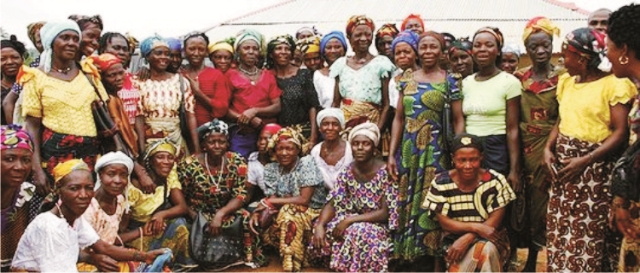Opinion
Still On Women’s Inheritance Right

It is a common knowledge that the constitution of the Federal Republic of Nigeria stipulates that there should be no discrimination against women, a position that align with the country’s status as a signatory to various treaties that frown at gender discrimination. But the curtailment of the right of women to share in family property some what places a serious indictment on the nation while posing a strong question mark on the hitherto constitutional stipulation of no discrimination against women.
In recent times, thanks to increase awareness, there has been an increase in the agitation for the enforcement of women’s right consequently, courts are increasingly inundated with matters bordering on the enforcement of the rights of women, especially the right to own and inherit property.
Women’s right do not mean insubordination but simply the enforcement of human rights of women, and human rights have been described a those basic claims which human being as individuals or groups need to maintain a minimum standard of decent living, respect and worth.
As erroneously believed, women’s rights are not an arbitrary creation but are derived from the International Bill of Rights. It includes the United Nations Declaration of Human Rights and the International Covenant on Economic, Social and Cultural Rights. Two common features of these rights are the principles of equality of all persons and non-discrimination based on the fact that all human without exception need the basic freedoms and conditions.
Beclouded by inferiority complex, greed and myopia, some persons have decided not to recognise women as equals.
Equality as employed here denotes the recognition of everyone as being able and capable, not in the sense that there is a pre-existing struggle for supremacy. Women and men are distinct in their rights and play complementary roles, therefore, there is no need to struggle for dominance.
The major yardstick to measure equality in any society is how far all the components of that society enjoy the basic human right and fundamental freedom. These rights which are reflected in chapter Iv of the constitution of the Federal Republic of Nigeria, 1999 as Fundamental Rights include the Right to life, the Right to Dignity of the Human Person, Right to Freedom of Thought, Conscience and Religion, Right to Freedom from discrimination, Right to acquire and own property anywhere in Nigeria.
Despite these constitutional provisions and convention on the Elimination of All forms of Discrimination against Women (CEDAW) women are not allowed to inherit or even purchase property in some parts of the country.
The constitution, in section 42 guarantees the right to freedom from discrimination yet people blatantly disregard this provision and trample on women’s rights.
It is still viewed as an aberration by many for a woman to own property or even aspire to hold some offices. Women who fight for their rights are abhorred and viewed as being foolishly re-calcitrant, likely to corrupt and poison the minds of other “decent” and “respectful” women. They are constantly denied and reminded of their place (the kitchen/background) whenever they dared to be heard.
Women who own properties, even in this 21st century, are perceived as vain and money loving. A woman dares not dream of getting an inheritance frm her parents. Also common is the dispossession of women by husband’s family members after the death of their husbands. Even where there is a will, forgery is alleged in the bid to dispossess the woman. Though this tradition is condemned by many in the open, it is still unabatedly perpetrated in most parts of the country.
It is important to recall at this point, the solemn declaration on gender equality in Africa, which reaffirms the principle of gender equality as enshrined in Article 4(1) of the constitution Act of African Union. Member states which Nigeria is one, declared to actively promote the implementation of legislation to guarantee women’s land, property and inheritance rights including the right to housing”.
The African Charter on Human and peoples rights ACHPR), which was domesticated in Nigeria under its enforcement and domestication Act Cap 10 1990, makes the charter enforceable in any court in Nigeria, making it mandatory on the various states of the federation to ensure the elimination of discrimination against women and also to protect the rights of women.
Let us desist from paying lip service to women’s rights. It is the obligation of government to promote and protect human rights (those of women inclusive). There should be equal distribution of rights and obligations between men and women to engender lasting peace and full utilisation of our human resources.
Sylvia ThankGod-Amadi
Opinion
NDDC: Time To Illuminate Homes

Opinion
When Democracy Becomes Too Expensive

Opinion
Righteous Leadership Still Thrives

-
Politics4 days ago
2027: NIGERIANS FAULT INEC ON DIGITAL MEMBERSHIP REGISTER DIRECTIVE
-

 Environment4 days ago
Environment4 days agoLAWMA Director Says Sweeping Reforms Have Improved Waste Collection
-
Politics4 days ago
LP Crisis: Ex-NWC Member Dumps Dumps Abure Faction
-

 Politics4 days ago
Politics4 days agoUmahi Dismisses Allegations On Social Media, Insists On Projects Delivery
-

 Sports4 days ago
Sports4 days agoAbia Not Sure To Secure continental Ticket
-
Politics4 days ago
NATASHA ELECTRIC VEHICLES INITIATIVE IN KOGI CENTRAL
-
Sports4 days ago
La Liga: Yamal Records First Career Hat-trick
-

 Sports4 days ago
Sports4 days agoPSG Extend Lead In Ligue 1

